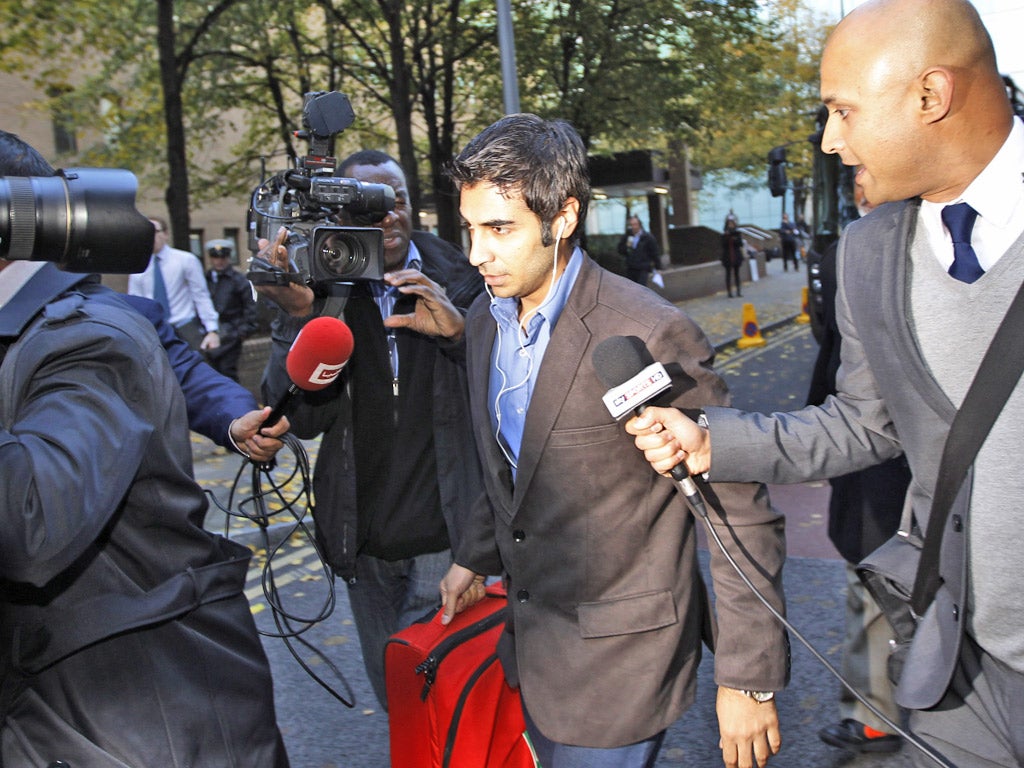'Suspicions' raised over two more Pakistan players
'This was cheating, pure and simple. They let everybody down'

The ICC, cricket's governing body, will meet with the Metropolitan Police before deciding whether they can take action against other Pakistan players in the wake of yesterday's conviction of Salman Butt and Mohammad Asif for spot-fixing during the fourth Test against England at Lord's last year.
A third player, Mohammad Amir, the game's brightest rising star, pleaded guilty to the charges before the five-week trial began. All three will be sentenced today and face up to seven years in prison. They have already been banned by the ICC for five years. During the course of the trial it was suggested by the prosecution that other Pakistan players in the squad that toured England last year, playing Test matches against Australia and the host nation, may have been involved in "suspicious" practices. Kamran Akmal and Wahab Riaz, who is in the squad currently playing a Test match series against Sri Lanka, were both named.
Aftab Jafferjee, QC for the prosecution, said in court that Akmal had led a "charmed life" in avoiding becoming involved in the investigation. Akmal was another client of Mazhar Majeed, the Croydon-based agent, who represented the three guilty players and who played a full part in the conspiracy to deliver three pre-arranged and deliberate no-balls during the Lord's Test. Majeed was also Riaz's agent and represented Imran Farhat, the batsman who is also still in the squad, and Umar Akmal. Jafferjee told the court that the actions of "Wahab Riaz and Kamran Akmal raise deep suspicions". The players deny any involvement.
Among the evidence that the police, who will not themselves be taking any further action, will hand over to ICC security experts is expected to be a number of texts – in all 9,000 texts and calls were recovered with the help of software belonging to the Royal Canadian Mounted Police – that suggest the attempts to spot-fix games extended beyond the Lord's and Oval Tests that featured in the trial at Southwark Crown Court.
The ICC may also come under pressure to review its security procedures, some of which the trial revealed to have been widely ignored by members of the Pakistan team. There are also questions to be answered over the governing body's response to allegations over Pakistan's tour to Australia in 2009-10, in which they lost every international fixture, and further allegations about the Asia Cup in Sri Lanka last year and the World Twenty20 Cup, also played last year in the Caribbean.
As part of the ICC's long battle against fixing, players were not supposed to have any guests in their rooms after 10pm and were only allowed to meet agents and other representatives in the lobby of the team's hotel, but those regulations were regularly breached. During his evidence Butt revealed that the players dismissed the team's security officer, Major Javed Khawaja Najam, as "Major 007".
The threat of match- and spot-fixing has dogged cricket for over a decade but no player has ever previously been criminally convicted. Haroon Lorgat, the ICC's chief executive, said last night: "We hope that this verdict is seen as a further warning to any individual who might be tempted to engage in corrupt activity within our sport.
"I am satisfied that we have worked closely with the Crown Prosecution Service and Metropolitan Police throughout this entire process, and I believe that this case has shown that it is possible for criminal authorities and sports bodies to cooperate.
"I would reiterate that the ICC has a zero-tolerance attitude towards corruption and that we will use everything within our power to ensure that any suggestion of corrupt activity within our game is comprehensively investigated and robustly prosecuted. We have always said that we will continue to explore every possible avenue to ensure that cricket is free from corrupt activity."
Butt, Asif, Amir and Majeed were exposed by a News of the World sting – the police yesterday praised the "investigative" efforts of the paper and its reporter Mazher Mahmood – with Majeed taking £140,000 in cash in return for the no-balls. Marked £50 notes from the News of the World were later found in Butt and Amir's hotel rooms.
"This was cheating, pure and simple," said Detective Chief Superintendent Matthew Horne. "They let down everybody that bought tickets and they let down children when they are role models for those very children that are playing such a special game."
The illegal gambling market, which is controlled by "mafia" figures in India, Pakistan and the Middle East, is estimated to be worth $50bn a year. Cricket, because of its popularity in the subcontinent, has been particularly targeted.
Earlier this year the English and Wales Cricket Board established an anti-corruption and education unit. ECB chief executive David Collier said: "Integrity and fair play are the foundations for any sporting contest. ECB fully supports the work of the ICC anti-corruption unit."
Join our commenting forum
Join thought-provoking conversations, follow other Independent readers and see their replies
Comments
Bookmark popover
Removed from bookmarks